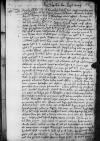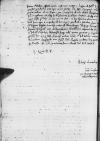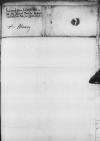Quamquam publice nuper ad Reverendissimam Dominationem Tuam ⌊⌋, impulsus metu quodam periculorum, dum me urgeret caritas Christiana admonere inclitam nationem ⌊Polonorum⌋ a malo ex ⌊Wittenberga⌋ veneni afflatu, revereor tamen nunc privatim ad Amplissimam Dominationem Tuam scribere, homuncio ignobilis et contemptibilis. Sed unus ministrorum Reverendissimae Dominationis Tuae ⌊Mathias Wolrab⌋ Lipsensis, mihi affinis factus, sic mihi dilectus est, ut eius commendandi gratia pudorem vincat officium. Rogo igitur suppliciter, ut Reverendissima Dominatio Tua gratiose in bonam partem has litteras accipiat. Misi quidem et antea ⌊⌋ privatas cum libellis aliquot, a me hoc anno ad ⌊Poloniae⌋ praelatos editis, sed nondum potui intellegere, an Reverendissima Dominatio Tua acceperit nec ne. Cum vero frater ⌊Mathiae⌋, cui neptem desponsavi meam, promittit certum e nundinis Lipsensibus latorem litterarum, iterum scribo, sed ero brevis, ne amplissimis negotiis Reverendissimae Dominationis Tuae molestiam ingeram. Imprimis igitur oro suppliciter et obtestor Reverendissimam Dominationem Tuam per gratiam et humanitatem suam doctissimis quibusque notam atque perspectam, ut ministrum supradictum, affinem meum, mihi tum affinitate tum indole sua carissimum, gratiose commendatum habeat, ita ut sentiat ille, commendationem meam alicuius fuisse apud Reverendissimam Dominationem Tuam momenti. Certe non tanti esset apud me affinitas, ut eum tanto praesuli commendare ausim, nisi arbitrarer talem esse indolem et genium adulescentis, ut ad gratiam, honorem et utilitatem Reverendissimae Dominationis Tuae servire possit.
Cetera de rebus ⌊Germaniae⌋ adiungam. Cum sciam igitur Reverendissimam Dominationem Tuam summe amicam et gratiosam esse clarissimo et omnium doctissimo viro domino ⌊Erasmo Roterodamo⌋, significo me hoc die litteras ab eo accepisse amicas et laetas, datas ab eo ⌊Friburgi⌋ 24 Novembris, in quibus sub finem ita scripsit: „Cum chiragra et podagra mihi saepe gravis est colluctatio. Multis diebus in totum abstinui a scribendo. Nunc adnitor, si queam Ecclesiastem meum absolvere, qui mihi serio praestandus est, ioco promissus. Onus increscit sub manu etc.” ⌊Coloniae⌋ perdidimus nuper doctissimum virum ⌊Arnoldum Vuesaliensem⌋, canonicum maioris ecclesiae, qui reconditissimam habuit in pectore suo theologiam pariter cum philosophia ex Graecis et Hebraicis fontibus. ⌊Oebanus(!) Hessus⌋ ex Graecis hoc anno carmina quaedam feliciter transtulit Erfordiae. Cum ⌊Philippo Melanchthone⌋ contentionem suscepi, maxime propter ⌊Polonos⌋ et ⌊Scotos⌋, cui alioqui privatim optime volo. Adversus novum ⌊regis Angliae⌋ matrimonium, quod revera adulterium existimo, acriter scribere coepi ad defendendum reginae coniugium et filiae legitimam procreationem, sed heri ex ⌊Moguntia⌋ litteras accepi, quae nuntiant, ⌊regem Angliae⌋ cum ⌊caesarea maiestate⌋ iniisse concordiam et recepisse ⌊uxorem⌋ veterem, ⌊filiam⌋que despondisse ⌊regi Scotiae⌋, adulescenti summae spei, quantum ex litteris et ex nuntio meo, qui in ⌊Scotia⌋ fuit, cognoscere potui. Scripsi per aestatem historiam hussitarum ⌊Bohemiae⌋ ex vetustis codicibus, quae in XII libros excrevit. Ferunt ⌊Lutherum⌋ nunc parturire nescio quae Penthei tonitrua adversus ecclesiam catholicam, ut a papa ad sectam suam trahat ecclesiam et catholicum orbi terrarum eripiat, ut angulo Wittenbergensi transcribat et ita cogat in angustum hereditatem ⌊Christi⌋, ut nemo sit ⌊Christi⌋, nisi qui est ⌊Lutheri⌋. Ego contentionum iam diu pertaesus, nihil opto vehementius, quam ut Deus per novum papam det nobis universale concilium, quod rebus perturbatis et medelam afferat et cum pace quietem. Si commode poterit
⌊frater ⌊Mathiae⌋⌋, affinis meus, iussu meo mittet e ⌊Lipsia⌋ ad Reverendissimam Dominationem Tuam quosdam ex libellis meis hoc anno editis. De ⌊Iohanne Campensi⌋ nihil prorsus audivi ab eo tempore, quo ⌊Cracoviae⌋ denuo edidit Paraphrasim suam in Psalmos, non absque laude plurimorum in ⌊Slesia⌋, Lusatia aliisque vicinis regni vestri provinciis. At sors mea ita fert, ut his temporibus ultra onus laborum ferre cogar et impensarum non leve onus in excudendis exemplaribus. Faxit Deus, ut desinat suspecta et molesta nobis esse ⌊Wittenberga⌋. Illustrissimus princeps ⌊dux Saxoniae Georgius⌋, etsi cum duce electore concordiam in temporalibus inivit, in fide tamen catholica constantissime semper eodem tenore permanet per singularem gratiam Dei, qui per hunc principem multos homines in fide ecclesiae retinet. Bene valeat Amplitudo Tua, Reverendissime Domine, praesulum eruditorum decus eximium.


